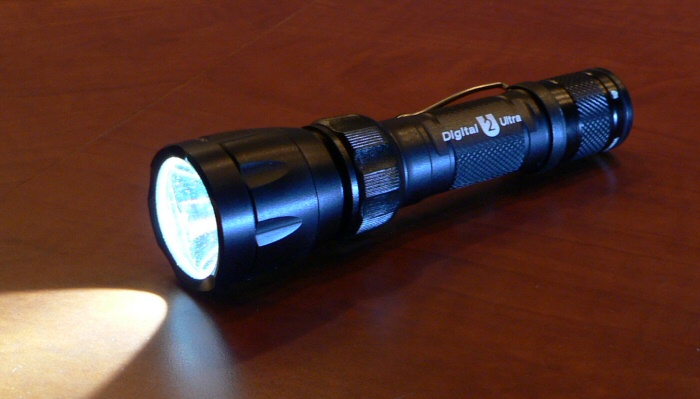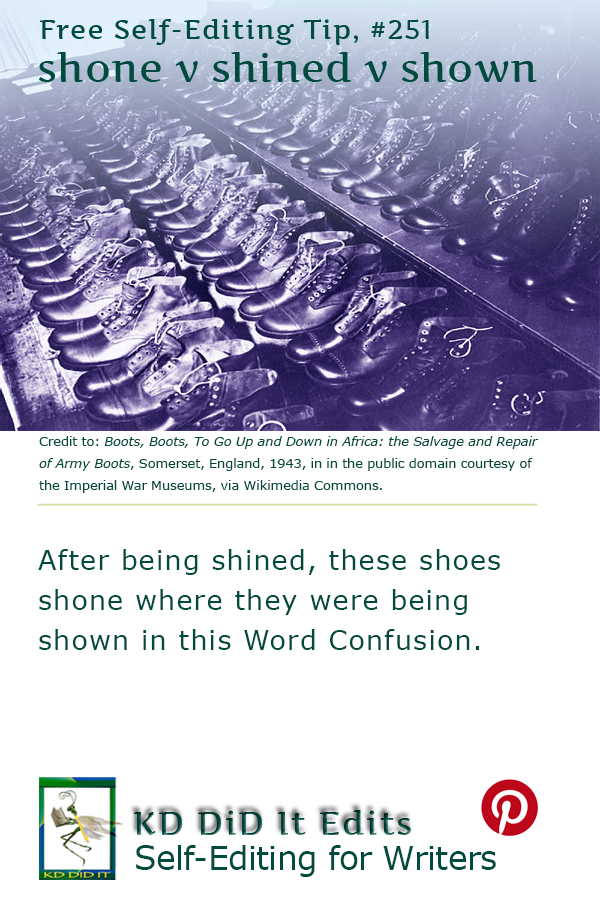Revised as of
29 Dec 2022
It’s a horrible misuse of shone, shined, and shown in this word confusion.
Shine
While shine is the root word for both past tenses and past participles, shone and shined are distinct from each other.
Shone is all about light.
Shined is all about polishing.
Show
When it comes to the morpheme show, the trick is deciding whether to use shone (past tense) and when to use shown (past participle shown, which is typically used in passive voice with helping verbs to create
present perfect (has shown) and past perfect (had shown)).
While shown is the traditional past participle, using shone is considered acceptable, as long as you include a helping verb — has shone and had shone.
Word Confusions . . .
. . . started as my way of dealing with a professional frustration with properly spelled words that were out of context in manuscripts I was editing as well as books I was reviewing. It evolved into a sharing of information with y’all. I’m hoping you’ll share with us words that have been a bête noire for you from either end.
If you found this post on “Shone vs Shined vs Shown” interesting, consider subscribing to KD Did It, if you’d like to track this post for future updates.
| Shone | Shined | Shown |
|---|---|---|

Surefire U2 by Joema and is in the public domain, via Wikimedia Commons. — The flashlight shone a light on the problem. |

A Woman in Mpumalanga Polishing a Wood Carving of an Elephant by Steve Evans from Citizen of the World (Africa Safari 006Uploaded by russavia) is under the CC-BY-2.0 license, via Wikimedia Commons. — She shined up a wood carving. |

Angry Sun is in the public domain and courtesy of WPClipart, via Wikimedia Commons. — Even as this sun shone in the sky, he’s shown his angry face. |
| Part of Grammar: | ||
| Morpheme: shine
Verb, intransitive & transitive Third person present verb: shines |
Morpheme: shine
Verb, transitive Third person present verb: shines |
Morpheme: show
Verb, intransitive & transitive Third person present verb: shows |
| To emit or give out a bright light
Verb, intransitive: [Of the sun or another source of light] Give out a bright light
[Figurative] Be brilliant or excellent at something [Figurative of a quality of skill] Be clearly evident Verb, transitive:
|
To gleam by polishing
Verb, transitive: Make an object made of leather, metal, or wood bright by rubbing it, polishing |
Verb, intransitive: Be, allow, or cause to be visible
Display or allow to be perceived (a quality, emotion, or characteristic)
Verb, transitive:
Display or allow to be perceived (a quality, emotion, or characteristic)
Demonstrate or prove
|
| Examples: | ||
| Verb, intransitive: The sun shone through the window. His eyes shone in the light of the fire. His eyes shone with excitement. She shone at comedy. Verb, transitive: He shone a torch on the body. Paul shone his shoes. |
Verb, transitive: Shoes get shined. He shined in algebra. Oh, man, he really shined you on. |
Verb, intransitive: Wrinkles had shown on her face. The muscles of her jaws had shown white through the skin. Other artists who had shown there included Robert Motherwell. That was the movie that had shown at the 1998 Venice Film Festival Her date hasn’t shown. Shirley’s pregnancy had finally shown when she was four months pregnant. His relief had shown too obviously. Verb, transitive: He has shown you all his woodwork creations. He hasn’t shown his work in years. She received a postcard that had shown the Wicklow Mountains. He was amazed that she had the gall to have shown herself. Frank had shown his frustration. His sangfroid had shown signs of cracking. He had urged his soldiers to fight them, and they had shown no mercy. He has shown women some respect. Experts say this had shown the benefit of regular inspections. The figures have shown that the underlying rate of inflation continues to fall. She has shown herself to be a harsh critic. He has shown himself to be an old-fashioned Baptist separatist. He has shown the boy how to operate the machine. He has shown them in. She was shown up as a fake. She was shown the way home. |
| Derivatives: | ||
| Adjective: unshined Noun: shining |
Adjective: unshown, well-shown Noun: show Verb: shewed, shewn, shewing, showed, showing |
|
| Phrasal Verb | ||
| shone through | shown off shown out shown someone off shown someone around shown someone up shown something forth shown something off shown something up shown through shown up |
|
| History of the Word: | ||
| Old English scīnan is of Germanic origin and is related to the Dutch schijnen and the German scheinen. | Old English scēawian meaning look at or inspect is from a West Germanic base meaning look is related to Dutch schouwen and German schauen. | |
C’mon, get it out of your system, bitch, whine, moan . . . which words are your pet peeves? Also, please note that I try to be as accurate as I can, but mistakes happen or I miss something. Email me if you find errors, so I can fix them . . . and we’ll all benefit!
Satisfy your curiosity about other Word Confusions on its homepage or more generally explore the index of self-editing posts. You may also want to explore Book Layout & Formatting Ideas, Formatting Tips, Grammar Explanations, Linguistics, Publishing Tips, the Properly Punctuated, Writing Ideas and Resources, and Working Your Website.
Resources for Shone vs Shined vs Shown
Apple Dictionary.com
“Shined vs. shone.” Grammarist. n.d. Web. n.d. <http://www.grammarist.com/usage/shined-shone/>.
Pinterest Photo Credits
Boots, Boots, To Go Up and Down in Africa: the Salvage and Repair of Army Boots, Somerset, England, 1943, is by a Ministry of Information Photo Division photographer and is in the public domain courtesy of the Imperial War Museums, via Wikimedia Commons.


